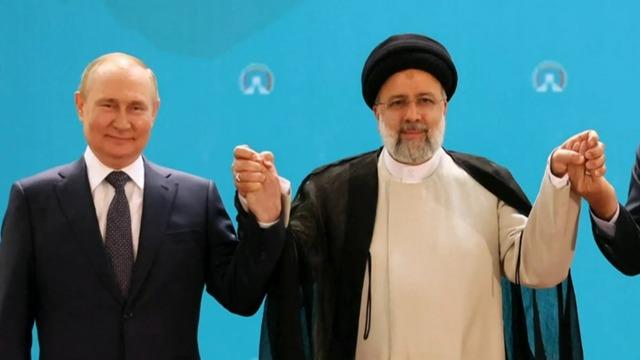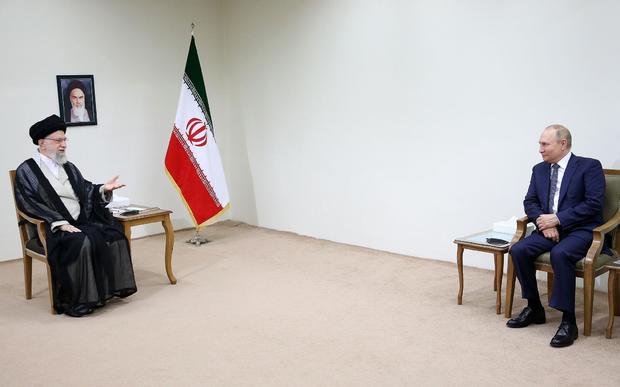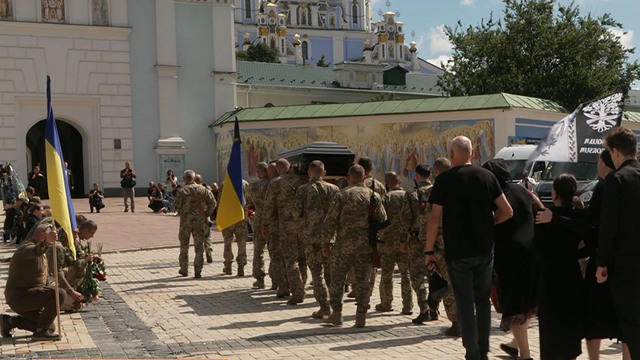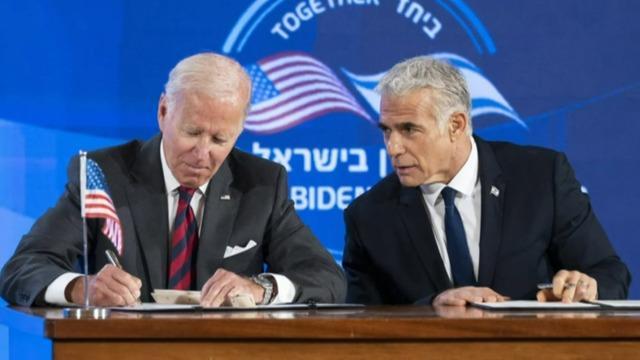▶ Watch Video: Russian President Vladimir Putin meets with leaders of Iran, Turkey in Tehran
Tehran, Iran — Iran‘s supreme leader offered his staunch support Tuesday to Russian President Vladimir Putin for his country’s war in Ukraine. Ayatollah Ali Khamenei demonized the U.S.-led NATO alliance and said the West was really working to prevent the growth of an “independent and strong” Russia.
A report published on the supreme leader’s website said Khamenei had told Putin that if he hadn’t sent troops into Ukraine, Russia would have faced an attack from NATO instead. The claim almost precisely echoed the defense for the invasion offered by Putin himself in the early days of the war, and it highlighted the deepening ties between two nations facing a barrage of Western sanctions.
The U.S. and its NATO partners have poured more troops into Eastern European countries, close to Russia’s borders, and sent shipment after shipment of weapons into Ukraine to help its vastly out-manned and out-gunned military counter Putin’s attack.
Iran hosted Putin and Turkish President Recep Tayyip Erdogan on Tuesday for talks on a range of regional issues. Putin also met Iranian President Ebrahim Raisi.
“War is a violent and difficult issue, and the Islamic Republic is in no way happy that civilians get caught up in it, but concerning Ukraine, had you not taken the initiative, the other side would have taken the initiative and caused the war,” Khamenei told Putin, according to the account by the supreme leader’s office. “NATO is a dangerous entity. The West is totally opposed to a strong, independent Russia. If the way is opened for NATO, it will recognize no limits. If it hadn’t been stopped in Ukraine, it would have later started a similar war in Crimea.”
As both countries’ economies strain under the weight of unprecedented sanctions imposed by the West, the Iranian leader stressed to Putin “Iran and Russia’s need for increasing mutual cooperation,” which he said, “should reach a peak in this period.”
While Russia’s attack on neighboring Ukraine has seen the U.S. and its allies heap sanctions on Moscow, Iran’s economy has struggled to cope with penalties imposed over its support for armed militant groups from Yemen to Lebanon and its nuclear program.
The Islamic Republic has steadily backed away from commitments it made to the global community in the 2015 nuclear agreement since former President Donald Trump unilaterally pulled the U.S. out of it in 2018, imposing a litany of new sanctions against the country in what his administration dubbed a policy of “maximum pressure.”
The move infuriated Tehran and frustrated American allies that worked for years to help negotiate the pact, which was aimed at ensuring that Iran could not gain the technical capacity to build a nuclear weapon in exchange for relief from sanctions.
Talks aimed at drawing Iran back into the agreement have stumbled along for years since then, but in the meantime, Iran — always pointing at Washington as the initial deal-breaker — has forged ahead with advances in its uranium enrichment program.
A senior advisor to Khamenei claimed earlier this week that Iran “has the technical ability to build a nuclear bomb,” with a supply of uranium now enriched to 60% — a short technological step away from the 90% required to build a nuclear weapon. Other Iranian officials have since stressed that Iran’s official policy of prohibiting the manufacture or use of nuclear, or any other weapons of mass destruction, has not changed.





































